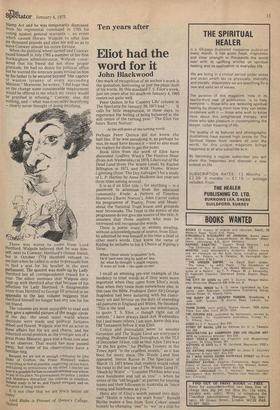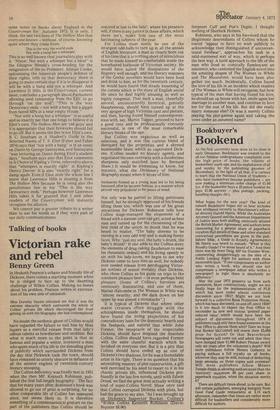Eliot had the word for it
John Blackwood
One mark of recognition of an author's work is the quotation, borrowing or just the plain theft of his words. By this standard T. S. Eliot's work, just ten years after his death on January 4, 1965 comes out quite well. Peter Quince, in his 'Country Life' column in The Spectator for January 30, 1971 had " . . . It calls for little imagination, in these days, to experience the feeling of being balanced at the still centre of the turning year." The Eliot fan hears 'Burnt Norton':
At the still point of the turning world.
Perhaps Peter Quince did not know the half-line. If he was parodying it, as perhaps he was, he must have known it — and so also must his readers for them to get the point.
Book titles from the work of Eliot have abounded: Godfrey Winn's The Positive Hour (from Ash Wednesday) in 1970, Lilacs out of the Dead Land.(from The Waste Land), by Rachel Billington in 1971, and Wild Thyme, Winter Lightning (from 'The Dry Salvages') for a study of L. P. Hartley by Anne Mulkeen last year are three titles among several.
It is as if an Eliot title — for anything — is a password to attention from the educated community. Knole: A Pattern of Timeless Moments CBurnt Norton'), John Carrol called his programme of 'Poetry, Prose and Music' about the National Trust house and grounds near Sevenoaks. The Trust in the notice of the programme do not give the source of the title. It assumes that those readers who may be interested will recognise the words.
There is poetic Irony in writers stealing, without acknowledgment of source, from Eliot: he admitted he was himself in his time a thief of other men's words. Eliot knew the verse of Kipling he includes in his A Choice of Kipling's Verse:
When 'Omer smote 'is bloomin'Iyie, He'd 'eard men sing by land an' sea; An' what he thought 'e might require, 'E went an' took — the same as me!
I recall an amusing pre-war example of the tendency to treat words as if they were more important when they came from Eliot's work than when they came from somewhere else, in this case the Bible. Professor (later Sir) George Stapledon had been lecturing with his customary wit and fervour on the duty of reseeding old pastures in England and Wales. He finished: —This is the land. . . we have our inheritance,
to quote T. S. Eliot though right out of context." I have always liked Ash Wednesday but I and many others. I am sure, knew this was Old Testament before it was Eliot.
Critics and journalists seem to assume Gerontion and The Waste Land are everyone's reading. Professor Denis Donoghue, in the TLS of December 14 last, told us that Allen Tate was "at the hot gates;" for Phillipa Toomey in the Times April "is the cruellest month," as it has been for many since The Waste Land first appeared. Simon Raven in The Spectator of March 13, 1971 knew that readers would relish his twist to the last line of The Waste Land IV, 'Death by Water' — "Consider Phlebas who was once handsome and tall as you" — when he wrote of the "old brigade" at parties for touring teams and their followers in Australia as "once young and handsome as you."
Have any of Eliot's words passed into daily use? "Home is where we start from": Ronald Blythe makes a line from 'East Coker' sound homely by changing "one" to "we" in a title for some notes on books about England in the Countryman for Autumn 1973. It is only, I think, the last two lines of The Hollow Men that everyone knows — without, of course, knowing quite where they come from: This is the way the world ends Not with a bang but a whimper.
This is so well known that journalists play with it: "Nixon: Not with a whimper but a bleat" is the Glasgow Herald's cross-heading for the resignation of the ex-President. Alistair Cooke, epitomising the American people's defence of their rights, tells us that democracy there is going to make certain that if it is to disappear it will be with a bang and not a whimper. And Lawrence D. Hills, in the Countryman, current issue, concludes a paragraph about Parliament allowing seed censorship from the EEC to go through 'on the nod': "This is the way Democracy ends — not with a bang but a giggle from bored MPs in a near empty House."
"Not with a bang but a whimper" is so useful and so exactly pat that one longs to believe it is Eliot's own. The Hollow Men are 'old guys' and it is appropriate that their fireworks should fail to go off. But it seems the line is not Eliot's own. B. C. Southam in A Student's Guide to the Selected Poems of T. S. Eliot (Faber and Faber 1974) says that "not with a bang" is in an essay on Dante by George San tayana, and San tayana "was lecturing on Dante during Eliot's student days." Southam says also that Eliot comments in A Choice of Kipling's Verse, referred to above, that "whimpers is exactly right" in Kipling's Danny Deever. It is also "exactly right" for a damp squib. Even if Eliot stole the whole line I know that Lawrence Hills is stealing it from The Hollow Men because he is using also the penultimate line in his "This is the way Democracy ends." Perhaps however Lawrence Hills takes it for granted that I and other readers of the Countryman will instantly recognise his allusion.
We cannot pay a greater tribute to a writer than to use his words as if they were part of our daily communications.



























 Previous page
Previous page